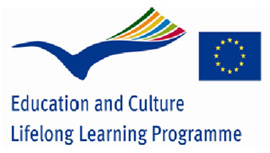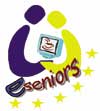 |
MEETING OUTPUT
INTERGENERATIONAL COMMUNICATION
|
 |
Contents
1 - Young people and motivation to
promote IC: experience and recommendations.
2 -
Activities for seniors and juniors.
3 -
Benefits for seniors and juniors derived from the intergeneration communication
1
- Young people and motivation to promote IC: experience and recommendations.
Main obstacles of IC:
The main
obstacles were identified by all partners organizations on the basis of their
longtime experience. Main obstacles are:
· Reciprocal conviction that different generations have no subject to talk about;
· Conviction on the lack of possibilities to communicate succesfully;
· Different languages. Languages have been changing, there are new words unknown by older generations;
· Misconception that most seniors are not interested in new technology
·
Lack of time
of young people;
·
Society
organisation changes permanently. Less possibilities in normal life are given
for a intergeneration dialogue. (Families as in former times with grandparents,
parents and grandchildren living together in one household are seldom).
>> No common interests
·
The school
curriculums do not emphasize voluntary work and are full of activities so that is impossible to add anything.
For expamle: In Finland only IB schools have voluntary work as a
compulsory "subject", but not the others.
Ideas on overcoming the obstacles:
· Intergenerational communication as a part of schools curriculum (cooperation of schools and different social institutions)
· Intergenerational communication as a theme of different school projects or training and after-school activities,
· Voluntary work of both generation (reciprocal influence); EU has developed a new initiative Lifelong learning programme called "Senior volunteering";
· Different activities and initiatives (see table below);
· Courses for Seniors run by young people;
· Meeting places for all generations with access to modern technologies (in adult education or senior institution, schools, NGOs´, town halls etc.);
· TV or radio programmes;
· Young people as creators of mini-dictionary on new words unknown for older generation (e.g. school project).
· Special offers for young people to train seniors. This offers must identfy the benefits for young people they have, e.g. if they train their abilities to present, t hey can use this also at school for their own life.
·
Motivation of young people to promote IC:
· Getting new experience;
· Helping others (young people know/feel that it is important/useful to help promote computer skills, use of modern gadgets etc.)
· Build new relationships/contacts
· Improve their skills and the level of education
Recommendation:
Motivation of promoting IC should be supported by schools
(secondary schools, universities). Experience from the Czech republic says that
different school initiatives (cooperation with senior institutions within
different projects, training as a part of educational process etc.) are
appreciated both by seniors and young people and those initiatives have a great
impact on IC.
Motivation of young people to teach seniors
as a benefit to IC:
· Learning/trying how to teach.
· Training for presentation and didactics
· Getting a certificate/recommendation for University (or Further training, Entrance Exam etc.)
· Travelling (visiting partner/similar organizations, within projects etc.)
· Getting new experience and preparation for future career.
· Elderly people as a "door-opener" in companies while young people look for a job.
2
- Activities for seniors and juniors.
|
Computer courses taught by young people For beginners. |
1) Individual teaching (stronger relationship).
Recommended training is 90 minutes ones a week (10 minutes break). Seniors
establish the pace of the training and appreciate the individual approach
(individual training can be a part of a school project or granted by EU
different initiatives). 2)Home assistance; 3)Group teaching (teaching experience for young).
Recommended number of senior students is up to 6 seniors per one junior.
Junior can also participate as an assistant. 4)Additional training with juniors: Really recommended activity. Advised number is 1 – 3 seniors per junior. 5) Juniors as "translators" (young
people introduce modern language and word connected with information
technology). The activity can be a structure of seminar, workgroup,
presentation etc. Recommendation for teaching of beginners: When teaching senior students, focus on slow pace,
more fun and more practice than theory (e.g. creating greeting cards,
calendars, easy pictures etc.), individual help, special books for beginners
structuring the lessons and learning with all senses - different games. Recommendation for adult education centers: The
realization of the project showed the positive experience of cooperation with
secondary schools and universities that can develop different projects and
programs for senior citizens and support young people to be volunteers.
Motivation of young people to teach/build relationships with senior citizens
can be dealt with on the level of secondary schools and universities in terms
of certificates, extra evaluation, part of the school curriculum etc.) |
|
Computer courses taught by young people For advanced |
1) young people as additional trainers (very
positive experience) Recommendation for teaching of advanced: More theory than practice, self study, individual
scripts. |
|
Cell phone courses taught by young people |
1) Juniors as individual help for cell phone
courses (different types of mobile phones). Recommendation for organizing the course: Small groups (6-10 students). Classes of 4 hours
last. Tips for seniors: Easy-to-use-models of cell phones are available on
the market (basic needs - calling and receiving calls). |
|
Different generations working together. |
·
In sport clubs ·
Political initiatives. ·
Cultural initiatives (theater, choral etc.) ·
Citizens´ initiatives |
|
Meeting place |
Idea of meeting place
(e.g. at school) for both generations with access to new medias. Café
for the Ages: Leisure groups: "The Internet Tea
salon" - listening to music, singing, playing games, storytelling Round table: Woman of different ages
discuss on the current topics and share experience and stories. |
|
House sharing |
Students living with
elders |
|
School of @ctive Seniors (S@S) |
Pack of activities for Seniors that are organized
and supervised by junior employees of the regional public Library in |
|
SEUIL intergenerational walk therapy for social reinsertion |
After a period of preparation, two young people,
accompanied by an adult or a senior , follow a route set in advance in a
foreign country bordering The presence of an accompanying adult who shares
the same conditions and has some influence on the behavior of the two young people during the trip,
forces teens to think more deeply than ever before, on their past and their
future. Structuring elements are the daily effort, the management of their
equipment, meetings and the prospect of success. |
3
- Benefits for seniors and juniors derived from the intergeneration
communication
Main benefits of IC and teaching for young people:
· Gaining new experience (life experience and memories)
· Gaining vocational experience of elderly
· Training for presentation, didactics and other related skills
· Certificates helping find better job
· Useful relationships and contacts (elderly people as "door-openers" while looking for jobs)
· Self -developement
· Transmission of tradition
Main benefits of IC for seniors:
· (Individual) computer training
· Catching up with new technologies
· New relationships/contacts)friends
· Sharing experience (against social isolation)
· Learn language of young people (against social isolation)
· Find subject to talk with young generation
· Possibility to communicate in general
· Self-developement
· Useful spending of free time (set up of different leisure groups)
· Transmission of tradition
4 - Local initiatives
|
Project "Senior" |
Project targets secondary schools. The project has
been run by the Ministry of education of the a) Be aware of your region (seniors
citizens learn about their region with the help of young people from a
secondary school involved in the project. The program involves sightseeing,
workshops, seminars and PowerPoint presentations) b) Modern means of communication (senior
citizens are trained to use computers and modern gadgets) c) Reasonable approach to your health
(seniors learn how to eat healthy, how to avoid of injuries and diseases, how
to be fit). d) Experience program (seniors as a
part of social games and activities, promotion of IC) e) Art and drama (seniors create and
introduce art and drama). |
|
Quo vadis, femina?“ |
Women of different ages and generations discuss
private and public topics and problems and share their life experience (e.g.
Communication across generations, Economical independence for women, Working
at home) |
|
Development of intergenerational dialogue with the help of music and
poetry |
Group of students prepares short performance for
senior people in retirement houses and other different places. Their
performances combine modern and older music and other arts to make it closer
to the older generation. |
|
Special project for seniors "Welness TV" |
This is a project of interactive personalized TV
for seniors with : - -Foibe
Diakoniasäätiö which offers in Palvelukeskus Foibe ( - Videra Ltd
who provides the technological platform ( http://www.videra.com/videra.htm) This project was set up with and for young
students learning social services and
healthcare providing them a new way of applied studies in a new technological
environment. The group of elderly people was of 11 persons. The
students make programs for elderly people. About health, counseling, healthy
food, services, music, etc. They make program in function of the needs and
demands of the seniors for as much as once a week. Programs can include
conferences (web conferencing), music audition, games ( such as everybody
says a sentence and the group sets up a whole story - creating a group story), group gymnastics.
There are some but few technical problems. One can also think of having it on
the TV screen of a person in her room,
having , in the morning, somebody greetings ( saying : Good morning!!) on the screen. The TV is in closed network
so no security problems. See more http://www.eseniors.eu/vantaa_senior-tv EN 5.6.08 _v2.htm |